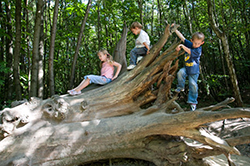Research
Research Status:completed
We use some essential cookies to make this website work.
We’d like to set additional cookies to understand how you use forestresearch.gov.uk, remember your settings and improve our services.
We also use cookies set by other sites to help us deliver content from their services.
The shared values that people hold for natural environments are important if ecosystems are to be managed for the benefit of all. These shared values are the values we hold in common as communities, cultures and societies. They are not always accounted for in conventional assessments and in decision-making. This research, conducted as part of the United Kingdom National Ecosystem Assessment Follow-on, provides an overview of the methods which can be used to incorporate shared values into decision-making and help decision-makers to take account of the views of those they are likely to affect.
This project was part of the National Ecosystem Assessment Follow-on research and sought to:
The research involved:

The UK NEA Follow-on projects started in 2011 and reported in 2014. The special issue of Ecosystem Services Journal was published in late 2016. Further work is developing.
Edwards, D. Collins, T. Reiko, G. 2016. An arts-led dialogue to elicit shared, plural and cultural values of ecosystems. Ecosystem Services 21, 319-328.
Irvine, K., O’Brien, L., Ravenscroft, N., Cooper, N., Everard, M., Fazey, I., Reed, M., Kenter, J.O. 2016. Ecosystem services and the idea of shared values. Ecosystem Services 21, 184-193.
Kenter, J.O., Reed, M. S., Irvine, K.N., O’Brien, E., Bryce, R., Christie, M., Cooper, N., Hockley, N., Fazey, I., Orchard-Webb, J., Ravenscroft, N., Raymond, C.M., Tett, P., Watson, V. 2016. Shared values and deliberative valuation: Future directions. Ecosystem Services 21, 358-371.
The UK NEA Follow-on phase was funded by the Department for Environment, Food and Rural Affairs (Defra), The Welsh Government and three research councils: the Natural Environment Research Council (NERC), the Economic & Social Research Council (ESRC) and the Arts & Humanities Research Council (AHRC), and coordinate with and leverage numerous ongoing research activities throughout the UK.

Principal Social Scientist
Cookies are files saved on your phone, tablet or computer when you visit a website.
We use cookies to store information about how you use the dwi.gov.uk website, such as the pages you visit.
Find out more about cookies on forestresearch.gov.uk
We use 3 types of cookie. You can choose which cookies you're happy for us to use.
These essential cookies do things like remember your progress through a form. They always need to be on.
We use Google Analytics to measure how you use the website so we can improve it based on user needs. Google Analytics sets cookies that store anonymised information about: how you got to the site the pages you visit on forestresearch.gov.uk and how long you spend on each page what you click on while you're visiting the site
Some forestresearch.gov.uk pages may contain content from other sites, like YouTube or Flickr, which may set their own cookies. These sites are sometimes called ‘third party’ services. This tells us how many people are seeing the content and whether it’s useful.